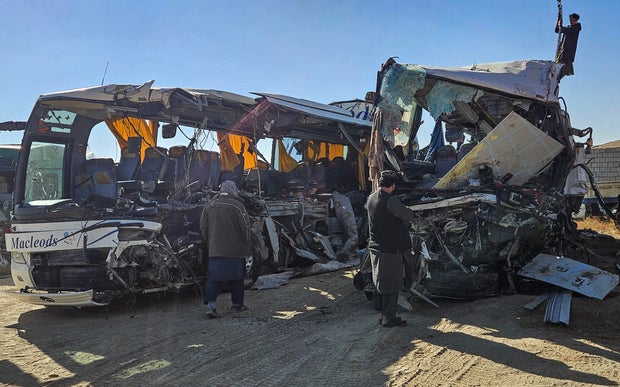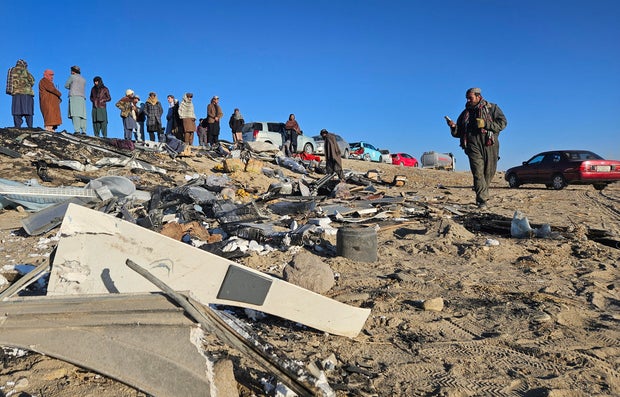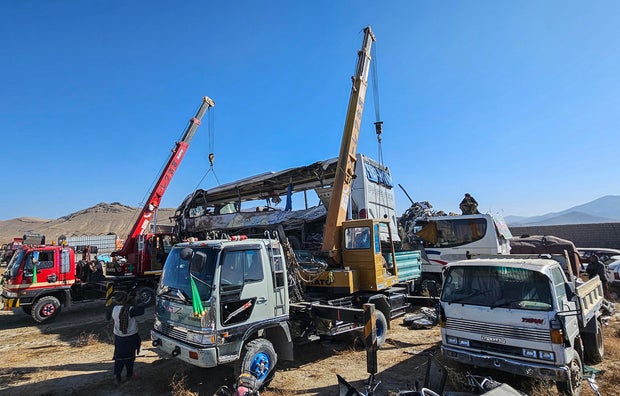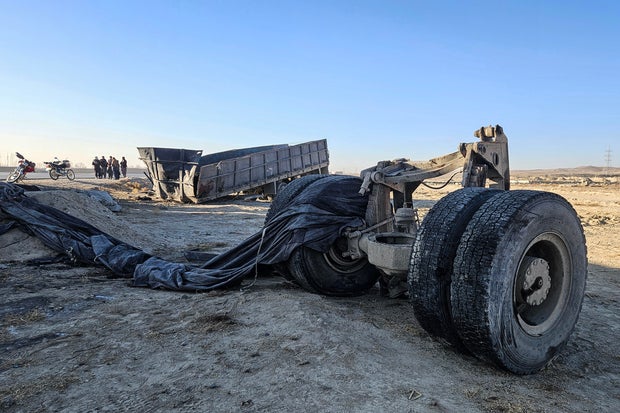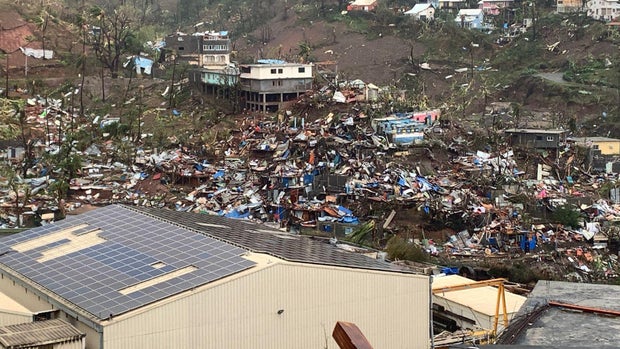CBS News
Chick-fil-A will allow some antibiotics its chicken, ditching its “No Antibiotics Ever” standard

Chick-fil-A is no longer promising “no antibiotics ever” in its chicken. The fast food chain said starting this spring, it would allow the use of chicken that may have had antibiotics.
In 2014, Chick-fil-A said it would shift to a “No Antibiotics Ever,” or NAE standard, meaning the company would not use any antibiotics-raised chickens.
But now it is switching to a “No Antibiotics Important To Human Medicine,” or NAIHM standard. Under this label, antibiotics are used to treat animals if they are sick, but use of antibiotics that are important to human medicine and are commonly used to treat people is restricted.
The company blamed supply chain issues, with a spokesperson telling the Associated Press there are concerns about the company’s ability to acquire antibiotic-free chicken.
Chick-fil-A promised to continue to only serve “real, white breast meat with no added fillers, artificial preservatives or steroids” and source chickens from farms that follow its Animal Wellbeing Standards, which includes U.S.-hatched and raised animals that are provided nutritional food and live in temperature controlled barns.
Under government agencies such as the Food and Drug Administration and U.S. Department of Agriculture, antibiotics are allowed in animals that are later used for food, but there are rules surrounding the use of these drugs.
These medicines can be used to treat infections in animals – just like they are in humans. But with antibiotic use, some bacterias could become resistant or unresponsive, a result called AMR, according to the FDA.
“Food animals can carry bacteria, such as Salmonella and Campylobacter, that can make people ill. When animals are given antibiotics, resistant bacteria in their intestines can continue to survive and grow,” the CDC explains.
That means when the animals are slaughtered their meat can become contaminated with this bacteria. Humans can get sick from these resistant bacterias when handling raw or uncooked meat and poultry or consuming other foods that have come in contact with animal feces, including drinking water.
Antibiotics, however, are effective treatments for animals, if they are used responsibly. The FDA has created an antibiotic stewardship plan that aims to reduce the risk of animals developing resistant bacterias. They advise livestock owners to use antibiotics only when necessary to manage illness in animals and the use of vaccines to reduce future need of antibiotics.
The USDA says before birds used for meat can be slaughtered, they must go through a “withdrawal” period from the time antibiotics are administered. “This ensures that no residues are present in the bird’s system,” according to the USDA. “Food Safety and Inspection Service randomly samples poultry at slaughter and tests for residues. Data from this monitoring program have shown a very low percentage of residue violations.”
Last year, Tyson, which makes many chicken products, also said it was ditching the NAE standard but would only allow antibiotics that are not important to the treatment of humans in its chicken production, the Wall Street Journal first reported.
Other companies, like Perdue, continue to use the NAE label.
CBS News
FAA bans drones over several New Jersey towns. See the list.

NEW YORK — Drones have been banned from flying over several New Jersey towns, the Federal Aviation Administration confirms to CBS News.
The FAA order covers nearly two dozen towns, including Jersey City, Harrison, Edison, Bayonne and Camden. It will be in effect until Jan. 17.
The order says no unmanned aircraft can operate below 400 feet within one nautical mile of the airspace specified in each area. Additionally, it allows the government to use “deadly force” against the drones if they pose an “imminent security threat.”
“Pilots of aircraft that do not adhere to the procedures in the national security requirements for aircraft operations contained in this section may be intercepted, and/or detained and interviewed by federal, state, or local law enforcement or other government personnel,” the order reads in part.
Several of the zones are centered around infrastructure, like power substations. Others cover areas like the Kearny, New Jersey port and airspace around military installations like Joint Base McGuire-Dix-Lakehurst in South Jersey, or airports such as Newark-Liberty International Airport.
Earlier this month, the Florham Park, New Jersey police chief told residents drone sightings had been reported above “water reservoirs, electric transmission lines, rail stations, police departments, and military installations.”
Where are drones banned in New Jersey?
North Jersey:
- Cedar Grove
- Bridgewater
- North Brunswick
- Metuchen
- South Brunswick
- Edison
- Branchburg
- Sewaren
- Jersey City
- Harrison, Essex County
- Elizabeth
- Bayonne
- Clifton
- Kearny
Central Jersey:
South Jersey:
- Burlington
- Evesham
- Camden
- Gloucester City
- Westampton
- Winslow
- Hancocks Bridge, Salem County
See the full order from the FAA here.
Mysterious drones over New Jersey and beyond
Drones sightings have been reported all month long, first over Morris County, New Jersey and then over several other East Coast states.
Federal, state and local officials have been demanding more information about where they are coming from and what’s being done to stop them. The FBI is leading the investigation and tells CBS News it has received thousands of tips.
While the White House says there is no known threat, New Jersey Gov. Phil Murphy recently sent a letter to President Joe Biden asking for more federal resources.
On Wednesday, a push from Sen. Chuck Schumer to give local law enforcement more ways to track drones was blocked in the Senate.
Check back soon for the latest updates on this developing story.
contributed to this report.
CBS News
2 bus crashes in Afghanistan leave dozens dead, dozens more hurt

Two highway crashes in southeastern Afghanistan killed a combined total of 50 people and injured 76, a government spokesman said Thursday.
One was a collision between a bus and an oil tanker on the Kabul-Kandahar highway late Wednesday, said Hafiz Omar, a spokesman for the governor of Ghazni province.
The other, also late Wednesday and in the same province, was in a different area of the same highway, which connects the Afghan capital with the south.
MOHAMMAD FAISAL NAWEED / AFP via Getty Images
Hamidullah Nisar, the provincial head of the Taliban-run Information and Culture Department, told the Reuters news agency the other accident involved a cargo truck, adding that some of those injured in both collisions were in critical condition.
Omar said many of the injured were taken to hospitals in Ghazni and patients in more serious condition were transferred to Kabul. Women and children were among the casualties, he said.
Authorities were in the process of handing over the bodies to families, Omar said.
MOHAMMAD FAISAL NAWEED / AFP via Getty Images
Crash survivor Abdullah Khan, who was being treated in a Ghazni hospital, said he didn’t know how many people had either died or were injured.
“I got out from the bus myself and heard the sound of moaning. There was blood everywhere. Some people had head injuries and others had hurt their legs.”
MOHAMMAD FAISAL NAWEED / AFP via Getty Images
Traffic accidents are common in Afghanistan, mainly due to poor road conditions and driver carelessness.
MOHAMMAD FAISAL NAWEED / AFP via Getty Images
CBS News
France’s President Emmanuel Macron tours cyclone-battered Mayotte, meets survivors pleading for help

Mamoudzou, Mayotte — France’s President Emmanuel Macron traveled Thursday to the Indian Ocean archipelago of Mayotte to survey the devastation that Cyclone Chido wrought across the French territory as thousands of people tried to cope without bare essentials such as water or electricity.
“Mayotte is demolished,” an airport security agent told Macron as soon as he stepped off the plane.
The security agent, Assane Haloi, said her family members, including small children, are without water or electricity and have nowhere to go after the strongest cyclone in nearly a century ripped through the French territory of Mayotte off the coast of Africa on Saturday.
KWEZI/AFP/Getty
“There’s no roof, there’s nothing. No water, no food, no electricity. We can’t even shelter, we are all wet with our children covering ourselves with whatever we have so that we can sleep,” she said, asking for emergency aid.
Macron got a helicopter tour of the damage and was to spend Thursday night on the far-flung French territory. After flying over the destruction, he headed to the hospital in Mamoudzou, Mayotte’s capital, to meet medical staff and patients.
Wearing a traditional Mayotte scarf on his white shirt and tie, sleeves rolled to the elbows, the French president listened to people asking for help. A member of the medical staff told him some people hadn’t had a drink of water for 48 hours.
Some residents also expressed agony at not knowing about those who have died or are still missing, partly because of the Muslim practice of burying the dead within 24 hours.
LUDOVIC MARIN/POOL/AFP/Getty
“We’re dealing with open-air mass graves,” Mayotte lawmaker Estelle Youssoufa told reporters. “There are no rescuers, no one has come to recover the buried bodies.”
Some survivors and aid groups have described hasty burials and the stench of bodies.
Macron acknowledged that many who died hadn’t been reported. He said phone services will be repaired “in the coming days” so that people can report their missing loved ones.
French authorities have said at least 31 people died and more than 1,500 people were injured, more than 200 critically. But it’s feared hundreds or even thousands of people have died in total.
Abdou Houmadou, 27, said emergency aid was needed immediately, not Macron’s presence.
“Mr. President, what I’d like to tell you… is I think the spending you made from Paris to Mayotte would have been better spent to help the people,” he said.
Another resident, Ahamadi Mohammed, said Macron’s visit “is a good thing because he’ll be able to see by himself the damage.”
“I think that we’ll then get significant aid to try and get the island back on its feet,” the 58-year-old said.
LUDOVIC MARIN/POOL/AFP/Getty
Macron’s office said four tons of food and medical aid, as well as additional rescuers, were aboard the president’s flight. A navy ship was due to arrive in Mayotte on Thursday with another 180 tons of aid and equipment, according to the French military.
People living in a large slum on the outskirts of Mamoudzou were some of the hardest hit by the cyclone. Many lost their houses, some lost friends.
Nassirou Hamidouni sheltered in his house when the cyclone hit.
His neighbor was killed when his house collapsed on him and his six children. Hamidouni and others dug through the rubble to reach them.
The 28-year-old father of five is now trying to rebuild his own house, which was also destroyed.
He believes the death toll is much higher than what’s officially being reported, given the severity of what he lived through.
“It was very hard,” he said.
Mayotte, located in the Indian Ocean between mainland Africa’s east coast and northern Madagascar, is France’s poorest territory.
The cyclone devastated entire neighborhoods and many people ignored the warnings, thinking the storm wouldn’t be so extreme.
Mayotte has more than 320,000 residents according to the French government. Most are Muslim and French authorities have estimated another 100,000 migrants live there.
Mayotte is the only part of the Comoros archipelago that voted to remain a part of France in a 1974 referendum.
Over the last decade, the French territory has seen a massive influx of migrants from the neighboring islands – the independent nation of Comoros, which is one of the world’s poorest countries.



